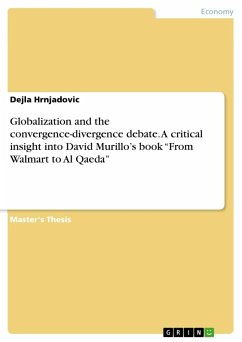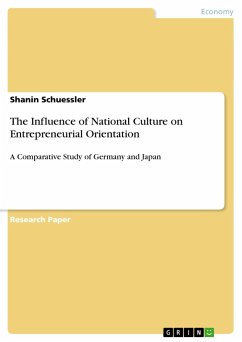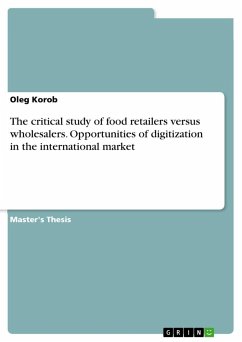Master's Thesis from the year 2015 in the subject Business economics - Miscellaneous, grade: 1,7, European University Viadrina Frankfurt (Oder), course: Marketing - International Management, language: English, abstract: Significant transformations have shaped the world in recent years and the concept of globalization has become one of the most controversial issues. Numerous studies have put their focus on the consequences of globalization on our lives. However, no agreement yet exists among scholars (Guillén, 2001). Speaking of globalization means understanding all its diverse dimensions and actors as well as discussing their transformative power. In his recent book "From Walmart to Al Qaeda" Murillo (2015) offers a multidisciplinary approach considering all the structural elements such as cultural, technological, economic, financial, political and institutional ones that shape and at the same time are shaped by globalization. By discussing the concept of globalization and its impact on each dimension, various approaches are used for diagnosing the direction of change and perils as well as benefits. In addition to that, Murillo (2015:xiii) suggests that "the very complexity and scope of globalization means any discussion requires examination of the various schools of thought, theories and approaches [...]" in order to gain a better understanding of the world. Even though institutional theory is closely linked to the process of globalization and has been widely applied to diverse fields when analyzing the consequences of globalization, this approach remains widely untouched in Murillo's (2015) book.Institutional theory has gained significant importance in sociological research and has become a leading theoretical foundation, as there is an increased importance of understanding that countries differ in terms of institutions (Diehl and McFarland, 2010:1740-1741). As "institutions are all around us" (Cornelissen, Durand, Fiss and Vaara, 2015:10) they do not only form a stable framework for cultural, legal and moral behavior, but also empower and support actions and in turn, face revolutionary changes over time (Scott, 2014:56-58; Barley and Tolbert, 1997:94). Hence, institutional theorists attempt to explain how established rules define our social reality and thus govern shared understandings, beliefs, structures and behaviors that conform to expectations of the environment and become legitimate (cf. DiMaggio and Powell, 1983; Meyer and Rowan, 1977). Globalization makes the world shrink, bringing people closer to each other (Murillo, 2015:xv) and hence interacting with different institutional forces, which leads towards diverse changes such as convergence, divergence








